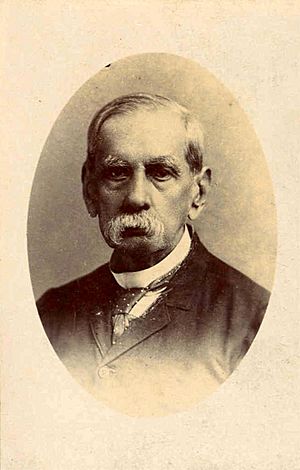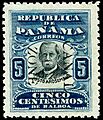Justo Arosemena Quesada facts for kids
Quick facts for kids
Justo Arosemena
|
|
|---|---|
 |
|
| Born | August 9, 1817 |
| Died | February 23, 1896 (aged 78) |
| Nationality | Panamanian, Colombian |
| Known for | Politician, lawyer, writer |
Justo Arosemena Quesada (born August 9, 1817 – died February 23, 1896) was an important leader, writer, lawyer, and politician from Panama. He lived when Panama was part of Colombia. He worked hard to make Panama more independent, even while it was still connected to Colombia. Many people call him "the most famous Panamanian" and the "father of Panamanian nationality."
Contents
Justo Arosemena's Early Life and Education
Justo Arosemena was born in Panama City. His parents were Dolores de Quesada and Mariano Arosemena. His father, Mariano, was a national hero who helped Panama become independent from Spain in 1821.
Justo went to elementary school in Panama. When he was 16, he earned a Bachelor of Arts degree from the College of San Bartolomé in Bogotá. Later, he studied law at the Universidad Central de Bogota. Between 1837 and 1839, he earned his doctorate in law from the Universidad del Magdalena. He also studied sociology, which is the study of how societies work.
A Political Career for Panama
Arosemena was elected as a deputy to the Provincial House of Panama from 1850 to 1851. After that, he became a representative in the National Congress of Colombia from 1852 to 1853. As a leader, he strongly believed in protecting human rights. He also wanted Panama to have more freedom and control over its own affairs within Colombia.
Because of his efforts, the federal state of Panama was created. This meant Panama would have more self-rule. Justo Arosemena was elected as its first president in 1855. However, he resigned from this position a few months later.
By 1863, he was the president of the National Convention of Rio Negro. This meeting changed Colombia into a group of independent states, and Panama was one of them.
Diplomacy and Important Negotiations
Starting in 1865, Justo Arosemena worked in diplomacy. This means he represented Panama and Colombia in other countries. He was Panama's representative in Washington D.C. for several years. He also served as Ambassador for Panama in Chile. Later, he was Colombia's Minister Resident in the United Kingdom. In 1872, he became Ambassador Extraordinary and Plenipotentiary in the United Kingdom and France. He even helped settle a border dispute between Colombia and Venezuela in 1880.
In 1868, he played a key role in talks about building a canal across the Isthmus of Panama. He helped negotiate the conditions under which Colombia would allow the United States to dig this canal. He also worked as a legal advisor for the Panama Railroad Company in 1888.
Later Life and Lasting Legacy
In 1878, Justo Arosemena helped start the first public library in Panama. He worked with educator José Manuel Hurtado and politician Buenaventura Correoso. Arosemena himself donated over 60 books on history and law to the new library.
In 1886, a new Constitution was created for Panama. After this, he decided to leave public life. He worked as a lawyer until he passed away in the city of Colón at the age of 78.
His important work as a lawyer and legal expert was recognized after his death. The main building of the National Assembly of Panama is now named after him.
Justo Arosemena's Writings
Justo Arosemena wrote many important essays. These writings show his work as a lawyer and someone who studied society. His most famous essay is "The Federal State of Panama." In this work, he wrote about Panama's history and its unique identity. He explained why it was important for the Isthmus of Panama to become a more independent area within the larger country of Nueva Granada. He used facts about geography, history, and society to argue for creating a Panamanian federal state. His ideas became a reality in 1855 with the creation of the Federal State of Panama. This essay is seen as the most complete study of Panamanian identity in the 1800s.
As a member of the Congress of Nueva Granada in 1850 and a senator for the Isthmus of Panama in 1853, he wrote many new laws. He was very important in helping Panama gain more self-rule. His detailed drafts of laws, known as the Proyectos Arosemena, became the foundation for many laws in Panama and Colombia during the second half of the 19th century.
Key Essays by Arosemena
- Aim for the Introduction to the Moral and Political Sciences (1840)
- Consideration on the Frank Communication Between the Oceans (1846)
- Principles of Moral Politics (1849)
- Moral Code Based on the Nature of Man (1860)
- Studies on the Idea of an American League (1864)
- Political Constitutions in South America (1870)
- Constitutional Studies (1878)
- The Institution of Marriage in the United Kingdom (1879)
- The Marriage Before the Law
Images for kids
See also
 In Spanish: Justo Arosemena para niños
In Spanish: Justo Arosemena para niños
 | Stephanie Wilson |
 | Charles Bolden |
 | Ronald McNair |
 | Frederick D. Gregory |


